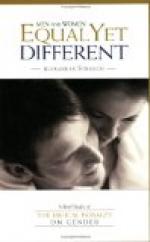There is no more honorable position on earth than that of a wife, possessing the undivided affection of a good husband, surrounded by an orderly and interesting family of children. Neither is there a more honorable position among men than that of a husband, possessing the undivided affection of a good wife, who sympathizes with him in his every care, surrounded by a family of well-behaved, intelligent children. A well-regulated household is a picture upon which the good of either sex love to look. The responsibility of regulating and ordering a household properly, devolves equally upon both the husband and wife. It can not be a well-regulated house if either fails to share the responsibility equally. Is the careful wife and mother, then, to be cut off from the rights of citizenship because she is a wife and mother? There is no valid reason why an intelligent woman should not be permitted to carry the weight of her judicious influence beyond the charmed circle of her home, any more than that she should not be permitted to exercise it there. Even in the limited sphere now assigned to women, many of them have proved that they could be faithful to the interests of their husbands and children, and yet accomplish much for the benefit of the world besides. Admitting, however—and we do admit it, heartily—that women are endowed with peculiar talents for the management of children, and men are better fitted than women for training horses or managing swine,—which occupation requires the greater mental culture? Which is likely to do the most for the benefit of mankind? The proper care for her children, and attention to them, does not necessarily prevent a woman from attending to matters of public utility outside of her house.
And then there are the unmarried women, who were referred to previously, that have not these household claims resting upon them. The objection concerning the neglect of households does not touch their cases at all; for they have neither children nor husbands to be neglected. That unmarried women, who step out from the “private sanctity of their homes,” often accomplish much good by entering on the so much censured public career, the lives of Florence Nightingale, Miss McPherson, and Miss Dix, if there were no others, amply prove.




